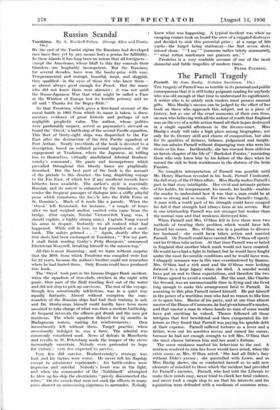Russian Scandal
Tsushima. By A. Novikoff-Priboy. (George Allen and Unwin.
las.) . •
By the end of the Tsarist regime the Russians had developed (nor have they yet by any means lost) a genius for fallibility. In these islands it has long been an axiom that all foreigners—
except the Americans, whose bluff to this day conceals their
blunders—are laughably incompetent. But the Russians, for several decades, have won the booby-prize with e_a_ce.
Temperamental and corrupt, boastful, inept, and sluggish,
they qualified—in the eyes of those few who knew them— as almost always good enough for Punch. But the many
who did. not know them were alarmist ; it was not until the Russo-Japanese War that what might be called a Face at the Window of Europe lost its horrific potency and we all said " Thanks for the Bogey-Ride."
So that Tsushima, which gives a first-hand account of the naval battle in 1905 from which its name is taken, is docu-
mentary evidence of, .great historic and perhaps of not negligible prophetic value. The author, whose politics were pardonably suspect, served as paymaster's steward on board the Oryol,' a battleship of the second Pacific squadron.
This fleet of thirty-eight ships was dispatched to the Far East after the destruction of the first Pacific squadron at Port Arthur. Nearly two-thirds of the book is devoted to a description, based on collated personal impressions, of the engagement at Tsushima, where the Japanese, at trifling loss to themselves, virtually annihilated Admiral Rozhest- vensky's command ; the panic and -incompetence which prevailed throughout this bloody fiasco are graphically described. But the best part of the book is the account of the prelude to this disaster—the long, dispiriting voyage to the Far East, of which few if any unofficial records have hitherto been available. The author's style is essentially
Russian, and its naivete is enhanced by the translators, who render the frequent passages of dialogue into a stiffly playful
prose which transforms the foc's'le into the Fifth Form at St. Dominic's. Much of it reads like a parody. When the Oryol' left Kronstadt, for instance, " a couple of hours after we had weighed anchor, excited cries came from the bridge. (Our captain, Nicolai Victorovitch Yung, was, I should explain, a highly strung man.) Captain Yung waved his arms in despair. Instantly we all realised what had
happened. While still in tow, we had grounded on a sand- bank. The sailors grinned . . ." Again, shortly after the first shots had been exchanged at Tsushima ; For my part, I shall finish reading Gorky's Petty Bourgeois,' announced Electrician Kozyreff, betaking himself to the mizzen-top."
All this is most disarming ; and we learn without surprise that the MSS. from which Tsushima was compiled were lost
for 22 years, because the author's brother could not remember where he had buried them. Only Russia could have produced this book.
The Oryol ' took part in the famous Dogger Bank incident, when the squadron of iron-clads, stricken in the night with panic, blew part of the Hull trawling fleet out of the water and did not stop to pick up survivors. The rest of the voyage, though less sensationally infelicitous, was in a quiet way equally fantastic. Almost without exception the com- manders of the Russian ships had had their training in sail, and Dr. Strabysmus himself could hardly have been more unsuited to take charge, of what was then a modern battleship.
At frequent intervals the officers got drunk and the men got mutinous. The whole squadron delayed for 2} months in Madagascan waters, waiting for reinforcements; then incontinently left without them. Target practice, when occasionally indulged in, was a farce. The admiral was commonly considered mad. News of defeats in Manchuria and revolts in St. Petersburg made the temper of the crews increasingly uncertain. Nobody even pretended to hope for victory ; very few expected to survive. •
Very few did survive. Rozhestvelisky's strategy was bad, and his tactics were worse. He never left his flagship except to administer reprimands ; his battle-orders were imprecise and suicidal. Nobody's heart. was in the fight, and when the commander of the Nalchimoff ' attempted to blow up his ship the electricians "privily disconnected the wires." On the vessels that were not sunk; the officers in many cases showed an unbecoming eagerness to surrender. Nobody
knew what was happening. A typical incident was when an escaping cruiser took on board the crew of a crippled destroyer and decided to sink this potential prize ; at a range of 800 yards—the target being stationary—the first seven shots missed clean. " I say' " (someone rather tritely murmured), " what rotten marksmen our gunners are.' "
Tsushima is a very readable account of one of the most shameful and futile tragedies of modern times.
PETER FLEMING,






































 Previous page
Previous page